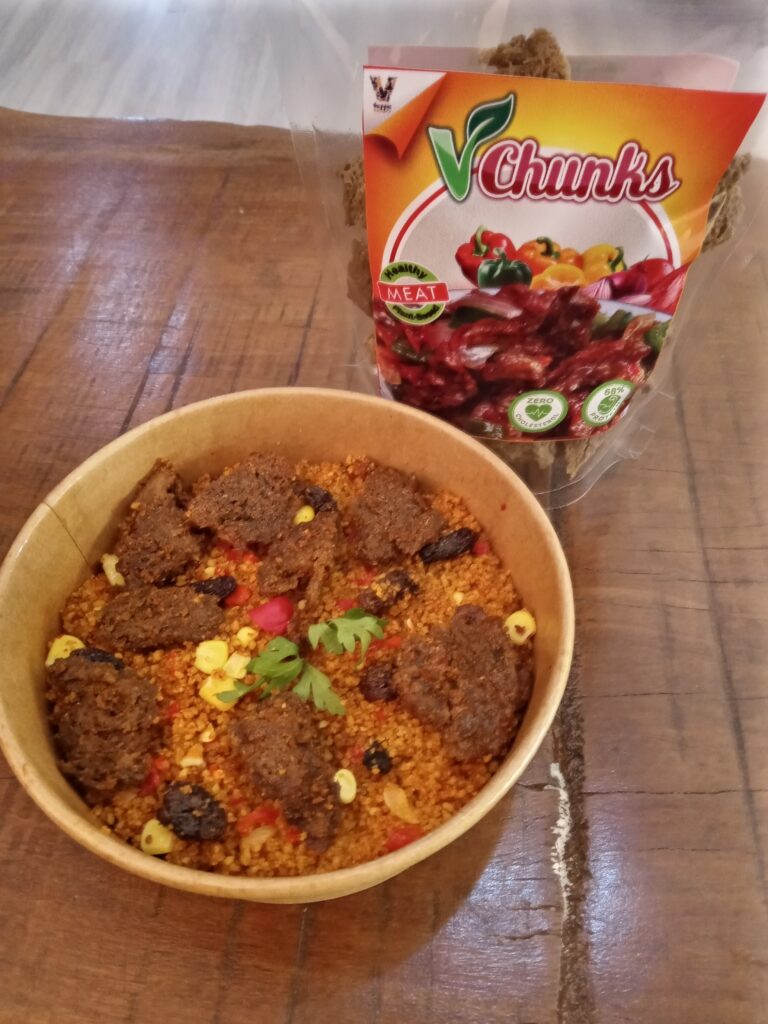Key strategies for plant-based success in the Nigerian market
Nigeria has a vibrant food heritage, a growing economy, and a trailblazing community of F&B innovators. With impressive population growth, it’s sure to play a major part as the world moves to transform the food system to one that is more sustainable.
Last summer, we sat down with Hakeem Jimo, VeggieVictory Founder and ProVeg Nigeria Director, to learn more about Nigeria’s emerging plant-based market.
Here, we recap the interview’s key takeaways to bring you actionable insights for unlocking the Nigerian plant-based market. Whether you’re a local business or an international brand, read on to learn how to attract Nigerian consumers to plant-based food and drink.
Leverage current plant-based consumption
Although plant-based foods and dishes (i.e. whole foods) are widespread in Nigeria, the actual concept of ‘plant-based’ or ‘vegan’ eating is relatively new in the country, according to Hakeem.
“We already eat a lot of plant-based food in Africa,” he told us. “We [ProVeg Nigeria] are not saying that ‘we are now eating vegan’ because there are already a lot of plant-based dishes. It’s just that nobody really thought about them before as plant-based.”
“I always emphasize that we eat much less meat compared to people in the Western world,” Hakeem continued. “It’s really more about preventing the increase in meat consumption when societies become richer.”

Since African diets already include a significant amount of plant-based foods, don’t focus on introducing a ‘new’ way of eating. Instead, businesses should focus on positively marketing the plant-based dishes and foods that are already part of Nigerian cuisine. Build on this positive awareness to create plant-based products that highlight and incorporate the ingredients and flavors that consumers already eat, drink, and love.
Brands should also use packaging, marketing, and advertising to emphasize the health and sustainability benefits of plant-based foods. Encourage the consumption of these over animal products by highlighting their familiarity and nutritional advantages.
Create a rich eating experience, while being mindful of branding
While the words ‘vegan’ and ‘plant-based’ frequent food labels and menus across Europe, these eating descriptors are less used in Africa.
Hakeem explained that when he first launched his plant-based restaurant, VeggieVictory, the “concept of veganism was completely strange.” He continued, “When we talked about plant-based food, it was a very strange thing, and it still is today.”
However, Hakeem explained that instead of emphasizing the plant-based nature of the food, they let the deliciousness of the dishes speak for themselves, enabling diners to make up their own minds about plant-based food.

“What we did right with the restaurant,” he said, “is simply gave people the food – let it ‘do the talking’ – and people liked it.”
In Nigeria, Hakeem advises against stressing the plant-based nature of dishes and products. Instead, let the taste and quality of the food shine through. But, Hakeem added: “It goes deeper.” You must also ‘know your consumers’ to create the ‘emotional eating connection’.
“In general,” he said, “eating is an emotional, cultural thing. But consuming plant-based products is a more rational decision. And when it comes to emotional against rational, you’re losing people. We need to do more than just throw products at people saying, ‘Eat this’, but really give them the experience.”
Consequently, Nigeria-focussed businesses must recognize that the decision to consume real animal meat is emotional, while opting for plant-based products is often a rational choice. This is especially prevalent in a country where meat-eating is aspirational, as Hakeem later told us: “There’s still the strong pull that, ‘As soon as I can get some money, I can afford more meat.’ If you have been deprived of meat your whole life, it does something psychologically,” he said.

To bridge this gap, businesses must go beyond merely promoting products and concentrate on recreating emotions that will have consumers hooked. So, work on delivering a holistic experience – not just taste but also appearance, smell, and texture – to appeal to the emotional and cultural aspects of eating.
When it comes to labeling, use only subtle plant-based logos or certifications on the back of product packaging, like the V-Label, avoiding prominent ‘vegan’ labels on the front.
Understand the unique Nigerian market dynamics
Back in 2013, Hakeem’s restaurant, VeggieVictory, made waves by becoming the first plant-based eatery – and later, brand – to launch in Nigeria.
Hakeem told us there is currently, “no established plant-based market in Nigeria.” So, how do you launch a product and attract customers in a market that has not quite formed yet?
“We need different approaches,” explained Hakeem. “In Nigeria, price parity, or even cheaper, is important because it’s a low-purchasing market.”

Not only is Nigeria a low-purchasing market but it also features what Hakeem calls an aspirational ‘catching-up mentality’ related to meat-eating.
“You can’t come here with premium products,” Hakeem continued, “because there is this ‘catching-up’ mentality – ‘I want to eat meat because most people don’t eat a lot of meat’. It’s still seen as an aspirational thing, just like, ‘I can afford a car now, I’m not only riding a bicycle,’ it’s the same outlook.”
According to Hakeem, businesses must recognize the unique economic and cultural factors influencing consumer behavior in Nigeria. While Nigeria lacks an established plant-based market, early entrants can lead the way by pioneering an accessible, affordable market that also has the aspirational allure of meat for consumers.
Set plant-based product prices at or below the cost of comparable animal products to entice more purchases. However, it’s also worth tailoring products and marketing strategies to align with local aspirations, and highlighting the health benefits of plant-based foods to appeal to consumer preferences.
Overcome distribution challenges
Unlike Western markets, where major retailers dominate, Nigeria relies heavily on local distribution, with over 70% of food items traded in local markets. So, if a food product does manage to make its way into some supermarkets, it’s not in the main channel, Hakeem told us.
If you want to launch plant-based products on the market, you must acknowledge that the distribution landscape in Nigeria differs significantly from Western markets. The absence of a widespread retail system requires a targeted approach.
So, how do you bring plant-based products to Nigerian consumers?1 More specifically, we need to ask: how do you get packaged, branded food products into the open markets?

“It’s a completely different story, logistically,” Hakeem explained. “Some products have figured it out, for example, ramen noodles, or companies like Nestlé and Unilever. So, if they could push it, great, then we have a big availability task done, but they’re not doing it.”
Focus on local markets, where a majority of food items are traded, and small traders. Understand the logistical challenges and work towards making plant-based products accessible in these markets.
According to Hakeem, small companies need to come together to drive innovation and navigate the complex distribution landscape. Collaboration between stakeholders, including awareness campaigns, funding support, and effective distribution networks, is essential for success.
Promote innovation and cultural relevance
It’s not only important to make sure that consumers can access your plant-based products, but it’s also vital that your products are culturally relevant to your target market. For example, it’s unlikely a product launched in the Netherlands would receive the same feedback if it was also launched in Nigeria.
“The product has to work for Africa,” Hakeem explained. “Plant-based burgers are probably not the right product; not everybody eats burgers in the world! It comes down to food being a cultural thing – you need to tap into that.”

Don’t simply launch products that have worked well elsewhere in the world. When developing plant-based products for Nigeria, understand that food is a cultural entity – not a one-size-fits-all approach. Success hinges on offering products that align with local preferences.
Products that reflect local tastes and traditions are more likely to gain acceptance, as well as those that can be used with Nigerian spices and in traditional dishes. Work with local restaurants, chefs, and businesses to tailor your products for Nigerian consumers.
Actionable insights
Establishing Nigeria’s plant-based market requires a nuanced approach, acknowledging existing consumption habits and navigating unique market dynamics. Prioritizing a rich eating experience over explicit labeling and addressing distribution challenges are crucial. By understanding and adapting to these factors, businesses can grow the market and contribute to a sustainable and flavourful future for Nigeria’s food industry.
Whether you’re a Nigerian business launching your first plant-based product, or an international company creating products for new audiences, follow our actionable insights to thrive in this emerging space:
1. Leverage existing plant-based consumption:
- Build on the fact that plant-based foods are already a significant part of Nigerian cuisine.
- Highlight the familiarity of plant-based dishes and their nutritional advantages.
- Emphasize health and sustainability benefits in packaging, marketing, and advertising.
2. Be mindful of branding and create a rich eating experience:
- Focus on the taste and quality of plant-based foods rather than explicitly emphasizing their plant-based nature.
- Understand the emotional and cultural aspects of eating in Nigeria.
- Deliver a holistic experience, considering taste, appearance, smell, and texture.
- Use subtle plant-based logos on packaging, avoiding prominent ‘vegan’ labels on the front.
3. Understand unique Nigerian market dynamics:
- Acknowledge the low-purchasing market and the aspirational ‘catching-up mentality’ related to meat-eating.
- Price plant-based products at or below the cost of comparable animal products.
- Tailor products and marketing strategies to align with local aspirations and highlight health benefits.
4. Overcome distribution challenges:
- Recognize the local distribution landscape.
- Focus on local markets and collaborate with small companies to navigate distribution challenges.
- Consider awareness campaigns, funding support, and effective distribution networks for success.
5. Promote innovation and cultural relevance:
- Ensure products are culturally relevant by understanding and incorporating local tastes and traditions.
- Collaborate with local restaurants, chefs, and businesses to tailor products for Nigerian consumers.
- Avoid a one-size-fits-all approach and consider products that align with Nigerian spices and traditional dishes.



